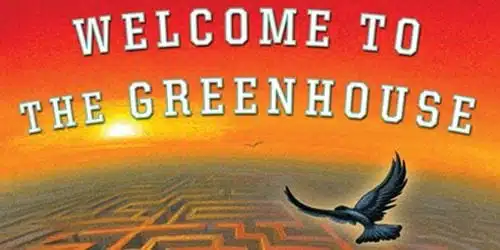
Through their work on television, Rod Serling and Gene Roddenberry learned that science fiction and fantasy provided a palatable veneer for stories which touched on hot-button issues of their day. Each struggled with meeting the demands of his creative muse as well as the whims of sensitive advertisers reluctant to have their products associated with anything controversial. Luckily, spaceships and monsters gave viewers enough distance from the reality of a story’s message to make them comfortable with uncomfortable ideas. That’s always been one of the primary functions of science fiction whether it’s on television, in movies or in print. Another function is speculation, imagining how the future will be given the circumstances at the time a story is written.
Right now climate change is a hot-button issue, one that elicits deep concern or scorn whenever it’s raised. Depending on your beliefs, climate change is either something to worry about later, a cause for immediate concern or complete bullshit. It’s an issue that consumes the political debate in the US, with opposing sides locked in a fierce ideological argument that rivals the battle over reproductive rights. There’s scientific evidence to support the claim that carbon emissions are creating warmer conditions around the globe, but it’s labeled by some as junk or radical. There are intense snow and rainstorms, floods and hurricanes — indicators of climate change — that are met with ho-hum reactions like, “If you don’t like the weather, wait five minutes.”
In Welcome to the Greenhouse, we don’t have to wait five minutes for the weather to change. This collection features new work by authors like Brian Aldiss, Alan Dean Foster, Pat MacEwen and more, each focused on the issue of climate change. There’s no argument that something is happening to Earth’s climate — but there are arguments about where those changes will lead us. One imagines a collection of such stories would be filled with portrayals of distant futures in which everything is either scorched or submerged. Though those elements are present, many of these stories feel closer to our own time, making the effects of climate change all the more real.
Gregory Benford’s “Eagle”, the story of a group of environmental terrorists out to stop a scientific mission they view as destructive, feels like a piece of journalism, a story from the front lines of the battle for the environment. On the flip side is Bruce Sterlings’s “The Master of the Aviary”, a story set far in the future about an isolated society struggling in the aftermath of war and famine caused by the depletion of precious resources like water and oil.
These two stories fit the book’s theme perfectly, but they wouldn’t feel out of place in any other collections. Anthologies are, by nature, a mixed bag, and what keeps this from being a great one isn’t the theme itself but its sometimes awkward insertion into the stories. In many of the stories there’s a point in which the phrases “climate change” or “global warming” appear and there is an audible thud. These are interruptive reminders to the reader that the story is “ABOUT SOMETHING”.
The exception is the best story in the book, George Guthridge’s “The Bridge”. It’s about a Native Alaskan woman with special needs named Andromeda. She is fighting for survival. The environment isn’t the villain here, rather it’s her abusive cousin, who plans horrific tortures for her by getting her pregnant to collect government assistance and using her as a sex slave. Guthridge evokes awful scenes of rape and desperation that linger long after the story is done. We’re given obvious clues as to what’s happened to the environment in Andromeda’s village–fish are dead, the ice is gone–but that’s only part of the scenery. In this story, the climate has changed for the worse, and it’s taken the people with it.
There are no answers for how to solve the issues of climate change in this book, only varying degrees of how things might turn out. Science fiction isn’t supposed to give us answers, though, it gives us outcomes, possibilities. Still, some stories include references to things people did to offset the effects of climate change, most notably in Paul Di Fillipo’s “FarmEarth”. Here, everyone over the age of 13 plays the game FarmEarth, which is really a worldwide project to care for and cultivate the earth’s fragile environment. It’s as if the Facebook game Farmville were more than just a complete waste of time.
Welcome to the Greenhouse isn’t all gloom and doom or dire predictions of the decline of civilization in the face of catastrophe. Alan Dean Foster’s “That Creeping Sensation” is a giant bug story that effectively creates the experience of the title and the last story, M.J. Locke’s “True North”, is equally hopeful and exciting and among the best in the book.
Regardless of your position on the issue of climate change, it’s fair to say that, no matter how advanced we become, we’re always at the mercy of Mother Nature. Ask the people of Japan, or New Orleans, or the people living in Tornado Alley. With any luck this collection will find its way into the hands of doubters who point to snow storms and freezing temperatures as evidence of the impossibility of climate change. Science fiction may help them see things that science can’t.
